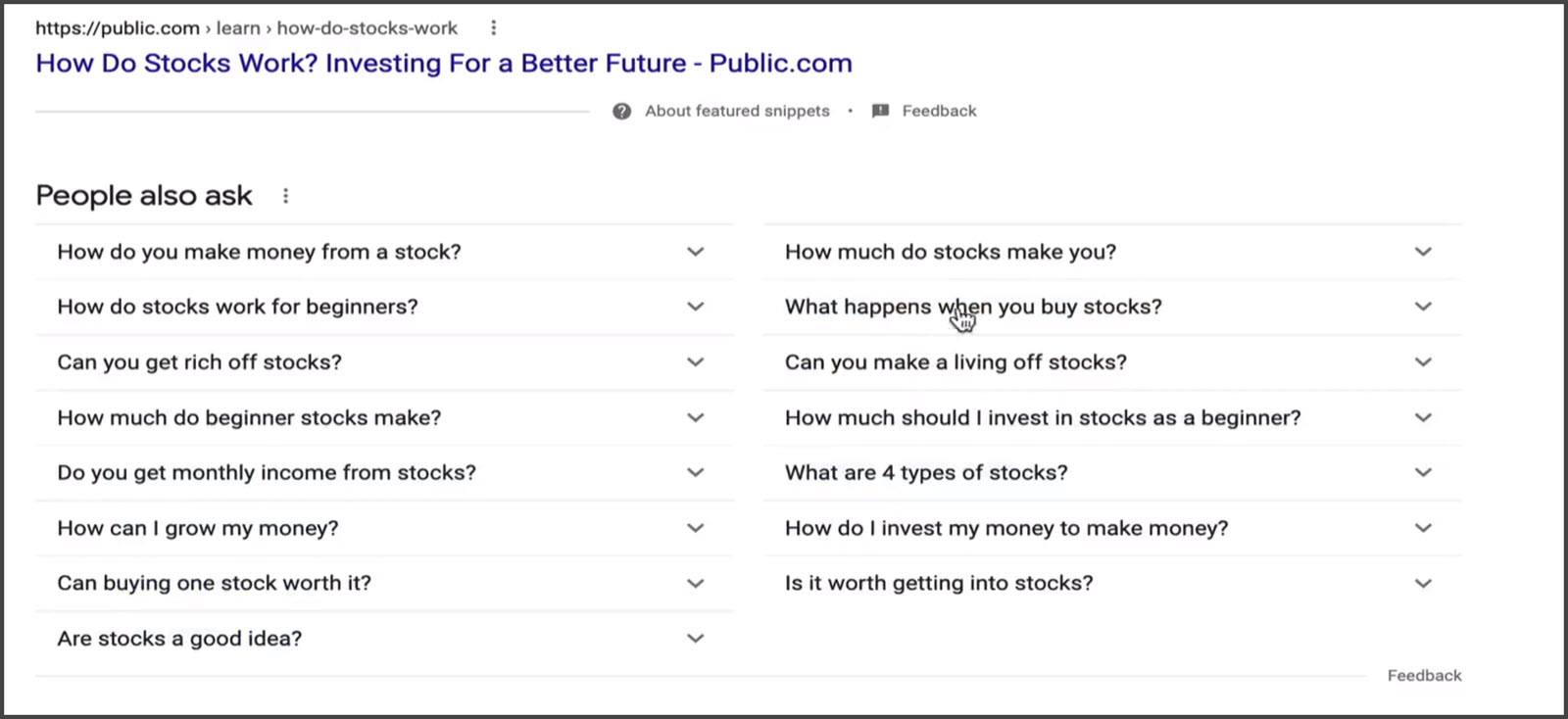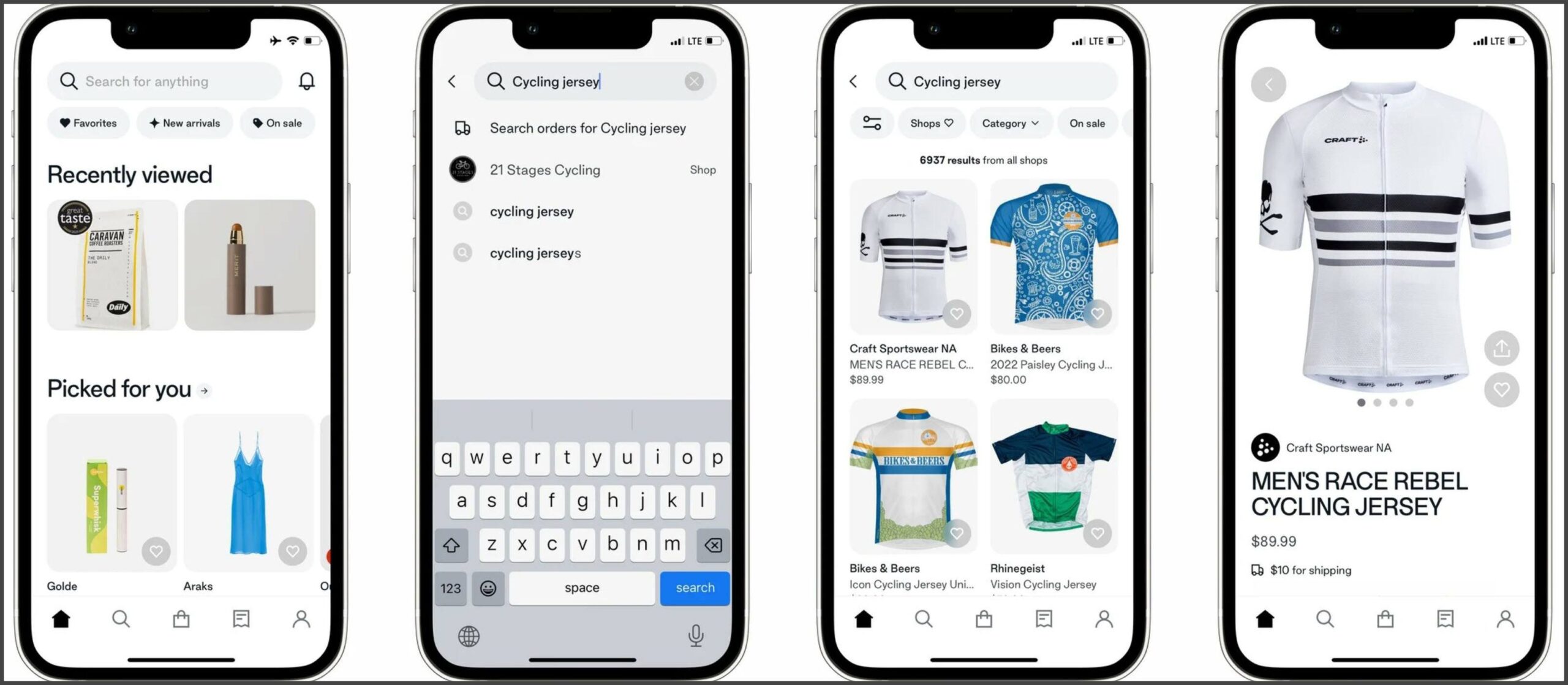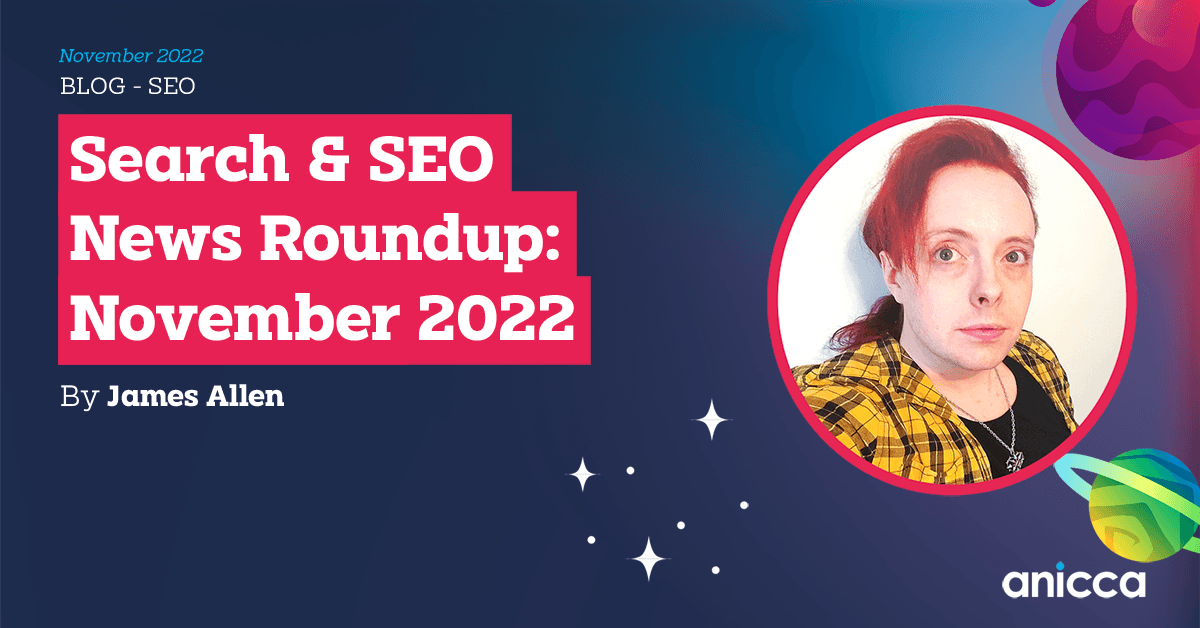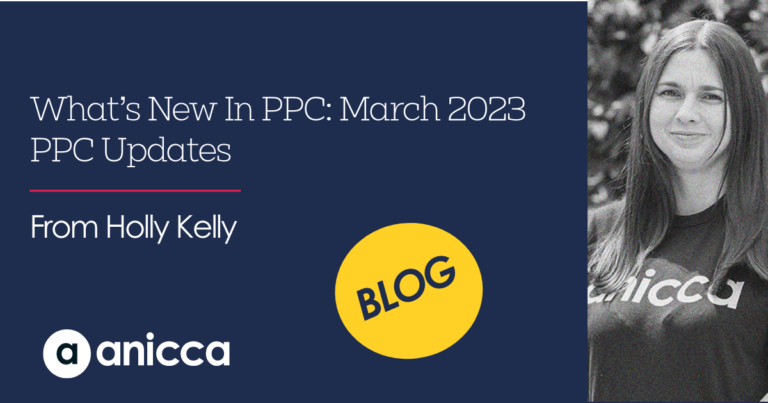Search & SEO News Roundup November 2022

What’s new in search during November? Google expands regional crawling and tests Reward Ad Gate program. Shopify becomes a search engine and marketplace.
During November 2022, these were some of the highlights:
- Googlebot Capable of Crawling from Outside the US
- Google’s new People Also Ask User Interface
- Reports of Google Account Managers Threatening to Contact Clients Directly
- Elon Musk Makes a Hire to Improve Twitter Search
- Google Tackles ‘Policy Circumvention’ with Documentation Update
- Google Tests Reward Ad Gate Program for Publishers
- Shopify Tests Universal Search Feature
- Fake Ownership Requests for Google Business Profiles
Read on for the low-down.
Googlebot Capable of Crawling from Outside the US
Posted November 25th on SEO Roundtable
Recently, Gary Illyes from Google confirmed that Google now has the capacity to crawl ‘from’ addresses based outside the USA. This doesn’t mean that Google has just added the ability to crawl websites which exist outside the USA, as most of us know Google has been able to do that for decades.
Instead, this means that Google can launch Googlebot crawls from non-US IP addresses. For example, imagine that you operate a site which is only viewable by users from a certain country. Perhaps other users get redirected to a blocked content notice. Previously Google may have struggled to crawl your site and content, since Google usually crawls from US IP addresses. Now that Googlebot can crawl from a wider range of locations, Google is capable of crawling such sites, pages and content.
There has been some back-and-forth over the announcing of this update. On Mastodon, Gary Illyes issued some slight corrections to his prior statement (read here if interested). There’s still some confusion regarding this update in terms of exactly what was meant, which parts are fundamentally true etc.
It seems though, that Google are broadening their capacity to search global content. The update is even more confusing as many SEOs had assumed Google could do this previously. Google have been clear to point out that this update is only likely to impact a minority of sites, where regional content is redirect-blocked.
Main takeaway: if you operate a site which utilises alternate server responses for users outside certain regions, it was previously very hard for Google to crawl your site. This update won’t fix all the issues, but it should make Google’s like a little easier (in terms of crawling your content).
Google’s new People Also Ask User Interface
Posted November 25th on SEO Roundtable
Google have made some alterations to the “People Also Ask” (PAA) user interface:

These changes are currently in limited testing. If the tests prove unsuccessful, then don’t expect to see this in your own web browser.
This may be an attempt by Google to prolong the amount of time which users spend on Google results pages. Though some users are already suggesting this, it’s a hunch at best. In reality, Google is performing its user-function better if users find what they need (be that on Google’s results page, or via a link) in less time. Google’s ads are still primarily click-based, so it wouldn’t seem to make much sense to try and extend the amount of time that searchers spend on results pages.
Main takeaway: Google continue to experiment with the visuals and layout of their search features. The reasons behind individual tests can only be guess at, so don’t read too much into these.
Reports of Google Account Managers Threatening to Contact Clients Directly
Posted November 23rd on Search Engine Journal
This is a very interesting item of news, from a usually reputable news source. According to Matt G. Southern of Search Engine Journal, the publisher has been receiving worrying reports.
Matt writes:
“There are a growing number of reports across the web of Google Ads accounts managers threatening to contact clients directly, despite not being allowed to.
According to the reports, agencies who don’t respond to emails from Google Ads account managers are being met with threats from Google reps to contact clients directly.
In some cases, the Google Ads account managers call clients and tell them to drop their agencies.”
Matt then goes on to say:
“There are two things to make clear here: (1) Agencies are not required to speak with Google reps, (2) at no point should a Google Ads account manager call an agency’s client”
If this news is true, then this is very concerning. We can only speculate at the KPIs which Google Ads Account Managers have been set, which are causing an up-tick in this kind of malpractice.
We (Anicca) categorically state that we cannot independently verify the claims made on Search Engine Journal. We find this publisher to be trustworthy. That being said, we are not replicating the statements of malpractice made by Search Engine Journal. Rather, we are commenting on Search Engine Journal’s coverage.
Main takeaway: keep an eye out for strange or pensive communications from your Google Ads clients. Check your email inbox for missed Google Ads rep messages. It is by no means certain that Google’s Ads Managers are engaging in malpractice. Whilst we can’t know for sure, it never hurts to keep a look-out. If you are a client and you receive unsolicited communications, make us aware so that we can give a detailed response.
Elon Musk Makes a Hire to Improve Twitter Search
Posted November 23rd on Search Engine Journal
It’s interesting to see continued and increasing overlap between search and social platforms. Elon Musk has decided to improve Twitter’s capacity as a search platform for Twitter users. No doubt, recent revelations that young people are using TikTok and Instagram ‘as’ search engines, are causing other platforms to adapt.
So, who has Elon Musk hired for this challenge? None other than George Hotz, a hacker of note and also an entrepreneur. It is unsurprising that Musk would hire someone with entrepreneurial spirit. Since both individuals share a focus on technology and profit, this seems like a match made in heaven.
In the past, Hotz declined an offer to work on Tesla’s driver assistance systems. Some have previously described Hotz as a Musk critic and even antagonist. Be that as it may, it appears that the pair have found common ground.
Main takeaway: search and social platforms continue to increase overlap in terms of the services and facilities which they provide. As those of younger generations turn increasingly to more visual search platforms (like TikTok), more established social networks race to close the gap.
Google Tackles ‘Policy Circumvention’ with Documentation Update
Posted November 22nd on SEO Roundtable
Often with these updates, we see Google updating and expanding existing policies within their spam policies. This time, that’s not the case. Instead, Google have created an entirely new policy, which you can find here.
The policy text reads:
“If you engage in actions intended to bypass our spam or content policies for Google Search, undermine restrictions placed on content, a site, or an account, or otherwise continue to distribute content that has been removed or made ineligible from surfacing, we may take appropriate action which could include restricting or removing eligibility for some of our search features (for example, Top Stories, Discover). Circumvention includes but is not limited to creating or using multiple sites or other methods intended to distribute content or engage in a behaviour that was previously prohibited.”
Essentially, Google are giving themselves the power to take action in the event of spam policy evasion. In reality, this is something which Google has probably been acting upon previously. It’s nice to see the information documented.
Main takeaway: if you produce content which Google takes action against on one domain, moving that content to another domain (to evade the policy penalty) is likely to result in a fresh penalty. The fresh penalty may not be limited to the individual item of policy-breaking content which you have moved. This will only affect black-hat SEOs to a large degree, or those operating large site networks with poor content quality control.
Google Tests Reward Ad Gate Program for Publishers
Posted November 22nd on Search Engine Land
Quite an interesting development for publishing websites which are operating Google Ads. Google have begin testing their “Reward Ad Gate Beta Program”. But what is it?

The only image we could find comes directly from Search Engine Land, and the resolution is fairly low. Rather than relying on this image alone, it’s best to review some of Nicole Farley’s comments:
“How it works. As described by WebmasterWorld.com, ‘The Rewarded Ad Gate beta program will give you an opportunity to monetize your most engaged users. If a user frequently visits your site, you’ll have a way to collect additional ad revenue.’
- The Rewarded Ad Gate will be displayed to a visitor on their fifth-page view of each month.
- If the visitor chooses to view a short ad, a video or image ad will play for 30 seconds or less.
- A ‘Thank you’ message will appear after the ad is complete and the visitor will gain access to your site.
- If the user chooses not to view a short ad, they won’t be able to access the site until their page views reset the following month or they choose to view the ad.”
This seems like a simple concept. The most engaged users for a publisher site (e.g: a site like NY Times, Techradar etc – a site which provides news or stories) will be served an ad which blocks access to the publisher’s content. If the user does not view the ad, they won’t be able to view the publisher’s content until the following month.
We’re not sure exactly how successful this will be. On the one hand, it creates a new revenue stream (ads) for publishers and their content. However, if users are blocked from viewing content, they will often just hit the back button (go back to search results) and then find another publisher with the same story, who isn’t aggressively gating their content. This could in some circumstances lead to extreme traffic loss.
We know from the publisher ads / ad-blocker war, that many publishers who guard their content too aggressively go under. By now, ad-blockers are baked into many web browsers and sometimes even operating systems. We’ve all seen the notices when we Google and article and click on one, “please whitelist our website from your adblocker”. But how many of us take the time to do this, rather than simply hitting back and re-navigating to another post covering the same story or information? Could these ads which gate content, simply cause users to look elsewhere for their desired information?
There’s also the question, is it fair to punish your most engaged readers?
Main takeaway: it will be interesting to see how this product performs in testing. If the ads revenue generated by this product offsets the assumed traffic loss, such ads could become a ‘normal’ part of the publisher web ecosystem. If these ads don’t supply enough revenue to offset a publisher’s loss of traffic, voice and authority… then perhaps this product won’t succeed. Only time will tell.
Shopify Tests Universal Search Feature
Posted November 21st on Search Engine Land
Is Shopify becoming a digital marketplace, and therefore a digital ecommerce competitor for the likes of Google? In 2021, Shopify stated that they had “no plans to be a marketplace”. That now seems to be changing.
As per an article from Search Engine Land, Shopify have unveiled the testing of a universal search feature for their app.

Users will be able to ‘Search for anything’. Products listed across all Shopify sites will searchable, all from the Shopify app. So why is this such a big deal? Well, it transforms the Shopify app in two ways.
Firstly, users will be able to search for products across all Shopify stores from one app. This means that Shopify will be encroaching on Google’s territory, through their new product search facilities. Secondly, by listing many products from many sellers and retailers in one place, Shopify will also be treading on the toes of Amazon and Google. They will become a searchable index of many products from a wide variety of sources.
By becoming a digital product search platform and marketplace, this may also open other doors. For example, will site owners be able to pay Shopify to place their own products and listing higher in the apps results? Will there be site-coding methods to enhance listings within the Shopify app, much like SEO does for Google product listings? It seems as if Shopify would create some means via which to commercially leverage these new facilities.
Main takeaway: as Shopify enters the product-search and digital marketplace spaces, there may be more opportunities to run ads and optimise listings. For now, this is all speculation.
Fake Ownership Requests for Google Business Profiles
Posted November 18th on SEO Roundtable
SEO Roundtable have documented a worrying increase in fake ownership requests for Google Business profiles. These are requests to manage your business on Google, from potentially malicious third parties (or actors whom may have nefarious intentions).
Imagine this situation. You are a client-side Head of Search, working away busily on a presentation for stake holders within your business. You are working with an agency, who manage all of your ‘Google stuff’. You see an email ping through, requesting access to manage your Google Business profile. Surely this is from your agency? You’re busy, so you just click the button and give the green light.
During next month’s report, it turns out some SEO traffic has been lost. It turns out that someone has removed your nicely branded knowledge panel from Google’s search results. When checking with your agency, it transpires that the access request did not originate from that business. Work must now be undertaken to clean up the mess, putting your next SEO campaign on hold whilst resources are tied up.
Theoretically, this could happen to anyone. In order to send you such a request, any web-user can do that so long as they can locate your email address and / or your Google Business profile. It’s as easy as clicking a button!
Be aware that spam-requests to manage business profiles have been on the rise. If the spammers target 1,000 profile managers, one or two will neglect to check the email properly and the spammers will gain the access which they can use. Don’t be caught out.
Main takeaway: spam requests to manage Google Business profiles have been rising. Read any such emails thoroughly, make sure that the request comes from a valid profile manager. Don’t get caught out, don’t lose results and control of your Google Business profile.




